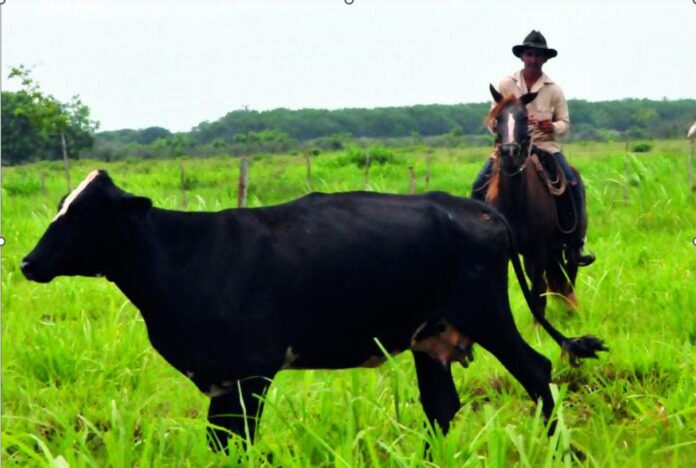
At least 1,615 Cuban ranchers have been tried for illegal cattle slaughter and selling meat, most of them with prison sentences.
By 14ymedio
HAVANA TIMES – Up to August of this year, the Cuban regime tried 1,615 people for “conduct associated with the crime of illegal slaughter of beef cattle and trafficking in their meat,” the government newspaper Granma reported on Tuesday. The sanctions, the media said, are the result of the “investigation of the use and possession of land and livestock” that the Government began to carry out last March.
“In correspondence with the provisions of the Criminal Code,” 90% of those sanctioned were sentenced to deprivation of liberty, the media explained. Of them, 78% were sentenced to sanctions of up to 15 years in prison, “which highlights the rigor in the treatment of these behaviors.” In addition, the defendants’ property was confiscated, and “other accessory sanctions provided for in the law” were applied.
According to Granma, which defends the rigor of the measures, the premise of the sanctions is “to manage the livestock mass and achieve greater discipline in the field, so that each producer knows the responsibility they have as a cattle breeder with the control, care and recording of events.”
With these actions, the government achieves two of its objectives: to intimidate the ranchers, who have shown their discomfort with the control of livestock and the land, and to hold producers responsible for the debacle of agriculture, despite the fact that the farmers have denounced the scarcity of resources to maintain their crops and their animals, in addition to the lack of support from the government.
However, Granma reminds the producers that business outside State channels is inadmissible. For meat trafficking, the penalties vary between three and eight years; for buying the meat, from six months to one year and a fine. Aggravating circumstances are charged for those who try to sell the product “to centers of processing, production, trade or food sales.”
Both the livestock and agricultural sectors are in moments of crisis on the Island. Last July, Alexis Rodriguez, general director of Economy and Agricultural Development of the Ministry of Agriculture, recognized the debacle in front of Parliament. Of the 10 fundamental items in agriculture, from 2023 and until last July, only the government’s plans of four had been fulfilled: vegetables, root crops, corn and rice. Meat, milk and egg productions are in a critical state.
For example, Cuba has lost 62% of its chickens and 72% of its pigs since 2020. On October 10, the Minister of Agriculture, Ydael Perez Brito, reported on Cuban Television’s official Round Table program about the first results of the exercise of control of the use and possession of land and livestock.
In his report, he blamed the poor yields of livestock on theft and slaughter that, according to Granma, is punishable by between four and eight years in prison. Perez added that there are other types of illegalities, such as illegal sales, unbranded animals and lack of records for missing livestock and deaths.
The alternatives to stop the debacle, beyond supervising the producers to exhaustion, have been few. “Our country has approved policies for the land that no one else has, such as lending it free of charge to sow,” and “we are giving cooperatives greater autonomy for their management,” have been the arguments of the officials to wash their hands of the crisis.
Some clues, however, have left the ruling party to decipher the problem: “The livestock areas have been destroyed” and with them a large percentage of the industry, Granma confessed last April. Likewise, the State has acknowledged that it does not have the budget to revive agriculture.
In an article published on April 4 of this year, entitled “There are ways to stop the deterioration of livestock,” farmer Miguel Valdes Carmenate, from Ciego de Avila, said in an interview that the sector in the country “is in a bad state because we have been allowing it to be destroyed for many years.”
His message was a reminder of the shortcomings suffered by producers. “For an adult animal, to ruminate it must have no less than 45 or 50 pounds of fodder in its belly and drink more than 70 liters of water daily. And more than half the cows don’t have either,” he warned.
Translated by Regina Anavy for Translating Cuba.
Read more from Cuba here on Havana Times.




